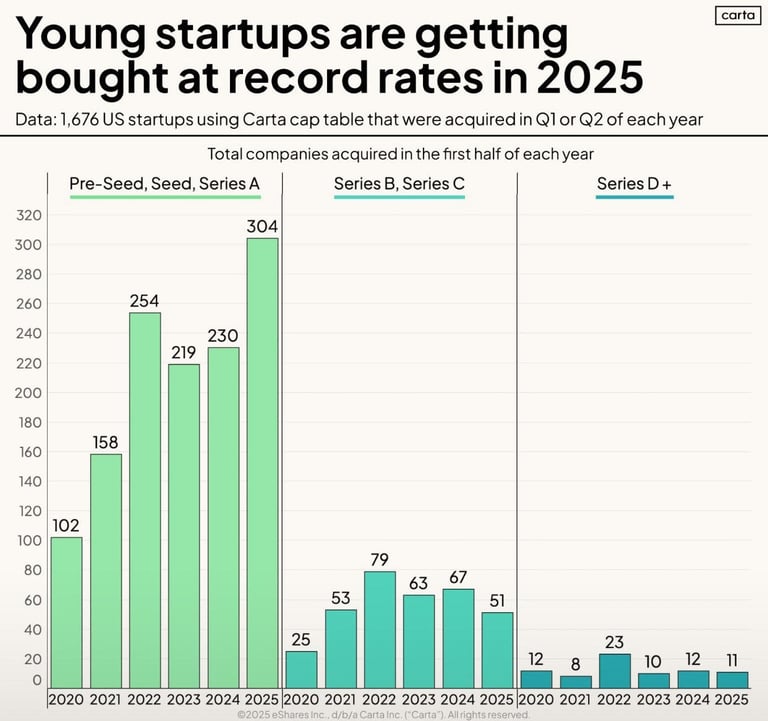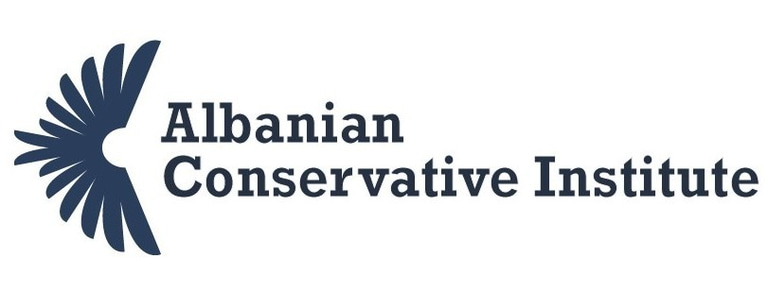Europa midis burokracisë dhe inovacionit: Koha që Brukseli të krijojë Silicon Valley-n e vet
Europe Between Bureaucracy and Innovation: Time for Brussels to Build Its Own Silicon Valley
Enri Çeno
10/11/20257 min read


Në horizontin e vitit 2025, startup-et amerikane po përjetojnë një bum të paprecedentë në blerje dhe bashkime. Sipas të dhënave të platformës Carta, numri i kompanive të reja që po blihen në fazat “Pre-Seed”, “Seed” dhe “Series A” është pothuajse trefishuar krahasuar me para pandemisë. Kjo tregon një dinamikë të jashtëzakonshme të tregut amerikan: një ekosistem që nxit lindjen, rritjen dhe blerjen e inovacionit.
Në anën tjetër të Atlantikut, Bashkimi Europian — një nga ekonomitë më të mëdha dhe më të zhvilluara në botë — vazhdon të ngecë në fazën e rregullimit, jo të krijimit. BE ka burime, talente dhe universitete të klasit botëror, por mungon shpejtësia, fleksibiliteti dhe guximi rregullator që i jep frymë startup-eve të reja.
Burokracia si pengesë strukturore
Europa shpesh e justifikon qasjen e vet konservatore me nevojën për “mbrojtje të konsumatorit” ose “siguri ligjore”. Por ky argument, në praktikë, është kthyer në një paralizë inovacioni.
Një startup europian përballet me një labirint të pafund licencash, procedurash dhe raportesh që konsumojnë energji, para dhe kohë — tre gjëra që startup-et nuk i kanë në tepricë.
Në shumë raste, proceset që në SHBA zgjasin javë, në BE zgjasin muaj. Për një sipërmarrës të ri që kërkon të testojë një ide në AI, blockchain apo teknologji shëndetësore, kjo vonesë është fatale. Ndërsa një startup amerikan mund të eksperimentojë brenda një mjedisi të hapur dhe të mbështetur nga investitorët privatë, europiani përplaset me formularë, kufizime ligjore dhe mungesë kapitali rreziku.
Një Europë që duhet të guxojë të liberalizojë inovacionin
Nëse BE dëshiron të jetë një lojtar global në teknologji, ajo duhet të ndryshojë rrënjësisht qasjen ndaj startup-eve.
Europa ka nevojë për një hapësirë të veçantë, të unifikuar dhe të mbrojtur ligjërisht për zhvillim teknologjik — një “European Innovation Zone”. Kjo zonë do të ishte një territor brenda BE-së me rregulla më të thjeshta, taksa më të ulëta dhe me mbështetje të drejtpërdrejtë për startup-et që operojnë në teknologjitë e avancuara.
Një Silicon Valley europiane, që do të shërbente jo vetëm si qendër zhvillimi, por edhe si laborator ligjor dhe ekonomik, ku vendet anëtare mund të testojnë politika të reja pa u penguar nga rregulloret e përgjithshme të Unionit.
Në këtë zonë duhet të:
• Aplikohet një tatim i reduktuar mbi fitimet e reinvestuara në kërkim dhe zhvillim;
• Lehtësohet hapja dhe operimi i startup-eve përmes një regjimi rregullator të përbashkët (jo 27 ligje të ndryshme kombëtare);
• Krijohen fonde publike-private që investojnë në fazat e hershme të startup-eve, me fokus në AI, semiconductors, data centers, blockchain, bioteknologji dhe quantum computing.
Krijimi i “Këshilli për Kërkimin në Inteligjencën Artificiale dhe Teknologjitë e Avancuara”
Në këtë kontekst, Europa ka nevojë për një strukturë të përhershme strategjike — një Këshill për Kërkimin në Inteligjencën Artificiale dhe Teknologjitë e Avancuara — e cila do të ketë funksionin e udhëzuesit politik dhe teknik për dekadën e ardhshme.
Ky këshill duhet të:
• Bashkojë aktorët publikë, privatë dhe akademikë në një ekosistem të përbashkët risie;
• Përcaktojë prioritetet teknologjike afatgjata (AI, kuantum, mikroçipa, etj.);
• Garantojë që kapitali dhe talenti europian të mos emigrojë, por të zhvillohet brenda territorit të BE-së;
• Bashkërendojë fondet e Horizon Europe, InvestEU dhe programet kombëtare në një strategji unike kontinentale.
Ky nuk është vetëm një projekt ekonomik, por një projekt politik i sovranitetit teknologjik. Në një botë ku dominimi i inteligjencës artificiale, i të dhënave dhe i çipeve përcakton fuqinë gjeopolitike, Europa nuk mund të jetë thjesht një rregullator pasiv. Ajo duhet të bëhet aktor aktiv, një prodhues teknologjie, jo thjesht konsumator.
Nga burokracia drejt vizionit
Shumë startup-e europiane janë të detyruara të zhvendosin qendrat e tyre në Londër, Zvicër apo SHBA për të pasur qasje më të lehtë në kapital dhe treg. Kjo është një rrjedhje e fshehtë e trurit dhe kapitalit, që Europa e humb çdo vit për shkak të vetvetes.
Një Europë vizionare duhet të dalë nga mentaliteti i kontrollit dhe të hyjë në epokën e besimit ndaj inovatorëve.
Në vend të frikës se teknologjia do të dëmtojë njeriun, duhet besuar se njeriu europian mund ta udhëheqë teknologjinë me etikë dhe qëllim. Dhe kjo kërkon më pak burokraci, më shumë eksperimentim dhe një kulturë që e shpërblen rrezikun, jo që e ndëshkon.
Shqipëria – një laborator rajonal për inovacion
Edhe pse jashtë BE-së, Shqipëria mund të luajë rolin e një laboratori të vogël për inovacion në Ballkan. Me një popullatë të re, me prani të fortë të diasporës dixhitale dhe me një sistem tatimor konkurrues, vendi ka potencialin të bëhet një microhub për startup-et teknologjike në rajon.
Për ta arritur këtë, qeveria shqiptare duhet të ndërmarrë tri hapa strategjikë:
1. Krijimi i një “Tech Free Zone” – një zonë të lirë ekonomike për startup-e teknologjike, ku tatimet, procedurat dhe licencat janë minimale, dhe ku mund të testohen inovacione dixhitale në mënyrë të lirë.
2. Themelojë “Këshillin Kombëtar Shqiptar për Inteligjencën Artificiale dhe Teknologjinë”, i cili duhet të ndërtojë strategjinë kombëtare për inteligjencën artificiale, automatizimin dhe kërkimin shkencor dixhital.
3. Partneritet midis universiteteve vendase, Instituteve Ndërkombëtare të Teknologjisë dhe sektorit privat, për të krijuar inkubatorë dhe qendra kërkimore që lidhen me rrjetet europiane të inovacionit.
Në këtë mënyrë, Shqipëria mund të pozicionohet si urë midis Ballkanit dhe BE-së, një vend që eksporton talente, ide dhe zgjidhje teknologjike – jo thjesht fuqi punëtore.
Inovacioni nuk rritet në tokë burokratike
Në fund, çështja nuk është nëse Europa ka talent apo burime — i ka me shumicë. Pyetja është: a ka kurajon politike për t’i liruar nga burokracia?
Nëse Brukseli dëshiron të jetë forca që udhëheq botën në epokën digjitale, duhet të ndërrojë filozofi: nga kontrolli drejt krijimit, nga rregullorja drejt vizionit.
Një Silicon Valley europiane nuk është luks — është nevojë strategjike për mbijetesë ekonomike dhe teknologjike.
Dhe në këtë proces, vendet si Shqipëria mund të jenë provat e para të një Europe që më në fund guxon të mendojë si një startup.
As we move into 2025, American startups are experiencing an unprecedented boom in acquisitions and mergers.
According to data from Carta, the number of early-stage companies being acquired at the “Pre-Seed,” “Seed,” and “Series A” levels has nearly tripled compared to pre-pandemic years.
This reflects an extraordinary dynamic within the U.S. market — an ecosystem that encourages the birth, growth, and acquisition of innovation.
Across the Atlantic, however, the European Union, one of the world’s largest and most developed economies, remains stuck in a regulatory mindset rather than a creative one.
The EU has resources, talent, and world-class universities — yet it lacks speed, flexibility, and regulatory courage, the very elements that breathe life into innovation.
Bureaucracy as a Structural Obstacle
Europe often justifies its conservative approach with the need for “consumer protection” or “legal certainty.”
But in practice, that has evolved into a paralysis of innovation.
A European startup faces an endless maze of licenses, compliance procedures, and reporting obligations that consume energy, money, and time — the three things a startup has the least of.
In many cases, processes that take weeks in the United States take months in the EU.
For an entrepreneur seeking to test ideas in AI, blockchain, or digital health, such delays can be fatal.
While an American startup can experiment freely under a supportive framework, a European founder often finds themselves entangled in administrative red tape and limited access to venture capital.
Europe Must Dare to Liberalize Innovation
If the EU wants to become a true global player in technology, it must fundamentally rethink its approach to startups.
Europe needs a dedicated, unified, and legally protected space for technological development — a “European Innovation Zone.”
This would be a shared territory within the EU, featuring simplified rules, low taxation, and direct support for startups working on advanced technologies.
In short, a European Silicon Valley — not as a copy of California, but as a European vision for high-tech sovereignty and creativity.
Such a zone should include:
Reduced taxation on profits reinvested into R&D and innovation;
Streamlined business creation and operations, governed by one simplified regulatory framework;
Public–private investment funds supporting early-stage startups in AI, semiconductors, data centers, blockchain, biotechnology, and quantum computing.
Establishing the “AI and Advanced Technology Research Council”
To complement this, Europe urgently needs a permanent strategic structure — an AI and Advanced Technology Research Council — to serve as both a political and technical compass for the next decade.
This council should:
Bring together public, private, and academic actors in a cohesive ecosystem of innovation;
Define long-term technological priorities in AI, quantum, microchips, and digital infrastructure;
Ensure that European capital and talent remain within the continent;
Align Horizon Europe, InvestEU, and national programs under a single, continental innovation strategy.
Such a council would not merely coordinate policies; it would embody Europe’s technological sovereignty — ensuring that the continent is not just a regulator of the digital age, but a creator and shaper of it.
From Bureaucracy to Vision
Too many European startups relocate their headquarters to London, Switzerland, or the U.S. simply to access funding and markets more easily.
This silent drain of talent and capital costs Europe dearly each year.
A visionary Europe must transition from a culture of control to a culture of trust.
Instead of fearing that technology might harm people, we must believe that Europeans can lead technology ethically and responsibly.
That requires less bureaucracy, more experimentation, and a mindset that rewards risk rather than punishes it.
Albania: A Regional Laboratory for Innovation
Although outside the EU, Albania can serve as a small laboratory of innovation for the Western Balkans.
With a young population, a growing tech-savvy diaspora, and a competitive tax system, the country could position itself as a microhub for digital startups in the region.
The Albanian government should take three strategic steps:
Create a “Tech Free Zone” — a special economic area for tech startups with minimal taxation, bureaucracy, and regulatory barriers, enabling rapid experimentation.
Establish an “Albanian AI & Technology Council” to design the national strategy for artificial intelligence, automation, and digital R&D.
Forge partnerships between universities and the private sector to build incubators and research centers integrated with European innovation networks.
Through these measures, Albania can become a bridge between the Balkans and the EU — exporting ideas, solutions, and digital talent, not just labor.
Innovation Cannot Grow in Bureaucratic Soil
Ultimately, Europe does not lack talent or capital — it lacks political courage to free them from bureaucracy.
If Brussels wants to lead the digital age, it must shift from control to creation, from regulation to vision.
A European Silicon Valley is not a luxury — it is a strategic necessity for Europe’s survival and prosperity.
And in that transformation, small nations like Albania could become the first proof that innovation thrives where there is freedom, vision, and courage.
